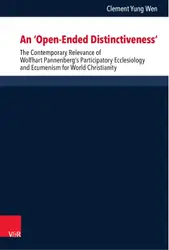Sara Mannen in her book rejects the notion that Karl Barth's theology makes God in the image of the modern autonomous subject and argues that his concept of divine personhood is best understood when reframed through the intellectual context that resulted from the Pantheism Controversy, which explicitly revolved around issues of the knowledge and nature of God and divine personhood. The work of Mendelssohn, Jacobi, Fichte, Herder, and Schelling created an environment that necessitated theologians address the concepts of divine personhood, divine absoluteness, and modern questions of theological epistemology. Mannen argues that Barth's distinctly modern conception of divine personhood reflects and responds to this environment by providing the necessary divine ontological foundation that establishes God is capable of self-revelation without detriment to God's absoluteness and that Barth's motivation for the occasional use of counterfactual language is to maintain God's personal nature and identity.
Starten Sie noch heute mit diesem Buch für CHF 0
- Hol dir während der Probezeit vollen Zugriff auf alle Bücher in der App
- Keine Verpflichtungen, du kannst jederzeit kündigen
Autor*in:
Reihe:
Band 180 in Forschungen zur systematischen und ökumenischen TheologieSprache:
Englisch
Format:

Living with Risk and Danger : Studies in Interdisciplinary Systematic Theology
Mikkel Gabriel Christoffersen
book
'Dark, Depressing Riddle' : Germans, Jews, and the Meaning of the Volk in the Theology of Paul Althaus
Ryan Tafilowski
book
The Heart of Dogmatics : Christology and Christocentrism in Herman Bavinck
Bruce R. Pass
book
An 'Open-Ended Distinctiveness' : The Contemporary Relevance of Wolfhart Pannenberg's Participatory Ecclesiology and Ecumenism for World Christianity
Clement Yung Wen
book
